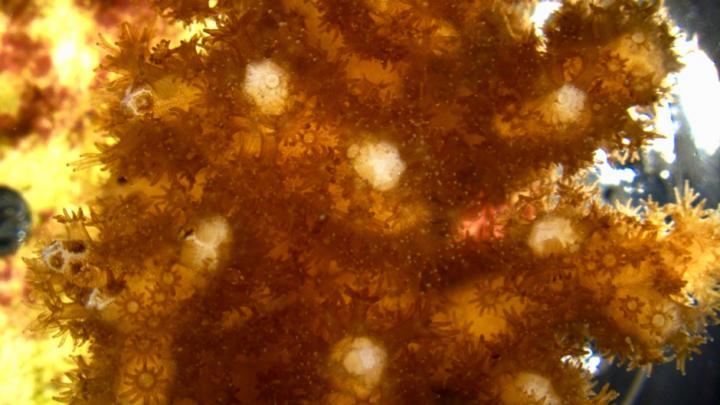
Credit: Mike Connelly
MIAMI–Researchers have perfected the recipe for keeping sea anemone and coral cells alive in a petri dish for up to 12 days. The new study, led by scientists at the University of Miami (UM) Rosenstiel School of Marine and Atmospheric Science, has important applications to study everything from evolutionary biology to human health.
Cnidarians are emerging model organisms for cell and molecular biology research. Yet, successfully keeping their cells in a laboratory setting has proved challenging due to contamination from the many microorganisms that live within these marine organisms or because the whole tissue survive in a culture environment.
UM cell biologist Nikki Traylor-Knowles and her team used two emerging model organisms in developmental and evolutionary biology–the starlet sea anemone (Nematostella vectensis) and cauliflower coral (Pocillopora damicornis)–to find more successful way to grow these cell cultures in a laboratory setting.
James Nowotny, a recent UM graduate mentored by Traylor-Knowles at the time, tested 175 cell cultures from the two organisms and found that their cells can survive for on average 12 days if they receive an antibiotic treatment before being cultured.
“This is a real breakthrough,” said Traylor Knowles, an assistant professor of marine biology and ecology at the UM Rosenstiel School. “We showed that if you treat the animals beforehand and prime their tissues, you will get a longer and more robust culture to study the cell biology of these organisms.”
“This is the first time that individual cells from all tissues of coral or sea anemones were shown to survive in cell culture for over 12 days,” said Nowotny, who is currently a graduate student at the University of Maryland.
There are over 9,000 species in the phylum Cnidaria, which includes jellyfish, sea anemones, corals, Hydra, and sea fans. Due to several special unique attributes such as radial symmetry, a stinging cell known as a nematocyte and two-dermal cell layer, there is growing interest in using these animals to study key aspects of animal development.
“We can also now grow coral cells and use them in experiments that will help improve our understanding of their health in a very targeted way,” said Traylor-Knowles.
###
The study, titled “Novel Methods to Establish Whole-Body Primary Cell Cultures for the Cnidarians Nematostella vectensis and Pocillopora damicornis,” was published in the Feb. 18 issue of the journal Scientific Reports. The authors include: Nikki Traylor-Knowles, James Nowotny and Michael Connelly from the UM Rosenstiel School. The study was funded through the National Science Foundation (award # 1951826) and Revive and Restore Catalyst Science Fund.
Media Contact
Diana Udel
[email protected]
Original Source
https:/
Related Journal Article
http://dx.




